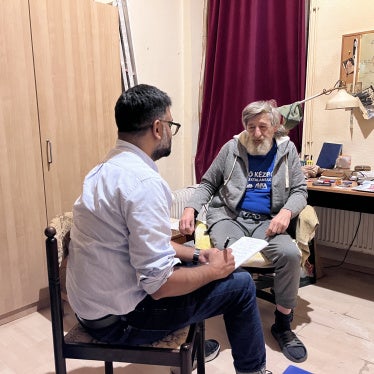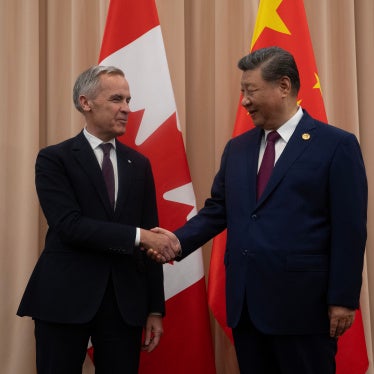(New York) – Draft amendments to limit funding of independent groups under Azerbaijan’s already harsh laws would make it nearly impossible for them to operate. These moves come as a prominent international coalition, the Extractive Industries Transparency Initiative (EITI), is to decide at a board meeting in Naypyidaw, Burma on October 14 and 15, 2014, what action to take on Azerbaijan’s membership in response to its intensifying crackdown.
EITI is an international coalition to encourage better governance of resource-rich countries by fostering open public debate about how oil, gas, and mining revenues are used. EITI rules for candidates and participating countries require respect for fundamental freedoms.
The initiative relies on the participation of governments, companies, and independent organizations at all levels, and free and active civil society participation is one of its cornerstones. For the past year the government of oil-rich Azerbaijan has been impeding the activities of independent groups, flouting its commitments as an EITI member.
“EITI’s leadership should suspend Azerbaijan and make clear what needs to change before it will consider lifting the suspension,” said Lisa Misol, senior business and human rights researcher at Human Rights Watch. “The Azerbaijani government’s latest move to crush independent groups confirms that it has no regard for its human rights obligations or its international transparency commitments.”
The government has refused to register the grants of independent groups for work on natural resource transparency or related issues and frozen the bank accounts of the majority of the independent groups in the national EITI coalition of nongovernmental organizations. Authorities have also opened politically motivated investigations for alleged tax or other violations and employed other intimidation tactics against leading EITI activists. As a result of the intense financial and other pressure, independent groups working on EITI have had to halt all activities, and the coalition’s participation in the initiative is at a standstill in Azerbaijan.
Some local activists, speaking anonymously due to the risk of government retaliation, have told Human Rights Watch they fear the government aims to eliminate independent groups and only allow those funded by and dependent on the government to participate in the national EITI process.
On September 30, a parliamentary committee introduced draft changes to laws regulating civic groups and grants that would have the effect of blocking any foreign funding that is not deemed to be in the government’s interest. As described in media reports and by local activists, the proposed changes will not allow foreign funding of groups unless the donors are registered and licensed in Azerbaijan and the grant project is individually approved by the relevant government ministry. It also requires all grant-financed activities to be registered by the Justice Ministry.
A member of parliament from the ruling party, Ali Huseynov, was quoted as saying that these restrictions were necessary for the sake of the government’s transparency commitments: “We have to stick to the transparency and anti-corruption initiatives in every sector. These changes will once again prove that we are [acting] in the right way to achieve transparency.”
Quite the opposite is true, however. The proposed measures are even more restrictive than rules that had been in effect through September, which were strongly condemned by the European Parliament and prompted criticism by United States President Barack Obama. The earlier rules requiring groups to register foreign grants with the Justice Ministry were used by the government to block funding of independent groups, including for work on EITI.
The Azerbaijani government has often highlighted its participation in EITI. It is a founding member of the initiative, currently sits on the EITI international board, and is rated as a “compliant” country.
In response to mounting concerns raised by Azerbaijani civic groups involved in the initiative, in September the EITI board sent a fact-finding mission to Azerbaijan to assess conditions for nongovernmental organizations. The mission’s findings and recommendations are confidential.
Speaking to the Financial Times ahead of the mission, Jonas Moberg, the head of the initiative’s secretariat, said that if EITI determines that Azerbaijan is not adhering to the rules, the board could consider suspending its membership.
The EITI board is mandated under the rules to either expel or suspend a government in response to a “manifest breach” of a “significant aspect” of the EITI principles or requirements. A suspension is a temporary measure, wherein suspended governments are expected to continue the national EITI process to show good faith so they can resume full membership once the concerns are satisfactorily addressed. The board also could demote Azerbaijan from “compliant” status to “candidate,” move up the date of a scheduled independent review of Azerbaijan’s membership, currently set for July 2015, or take a combination of these or other steps.
EITI should temporarily suspend Azerbaijan from membership and from the seat it holds on the EITI board until the government removes obstacles to civic groups’ full and free participation in the EITI process, consistent with the initiative’s requirements, Human Rights Watch said. Specifically, the Azerbaijan government should:
- Reject draft proposals that would enable it to block foreign-funded projects;
- Amend legislation regulating nongovernmental groups, in accordance with the recommendation made by a Council of Europe body, by simplifying overly burdensome registration and reporting procedures; eliminating onerous requirements for groups to operate, obtain funding, register grants, and access funds; and repeal overly complicated requirements for registering branches and representational offices of international groups;
- Halt unjustified criminal cases against foreign donors;
- Permit international groups to operate without undue interference, reject proposed restrictions that would make registering branches in Azerbaijan even more difficult, and allow international groups that have been forced to shut down due to government harassment to resume their activities;
- Cease all intimidation and harassment of independent organizations and activists, including retaliatory tax or other investigations, and unfreeze the bank accounts of affected groups, their leaders, and staff members;
- Allow independent groups to travel throughout Azerbaijan and hold training sessions or other activities without undue interference by the local authorities, as well as to travel abroad and to return to the country without harassment;
- Ensure an enabling environment for active civic participation and public debate on EITI, which entails respecting free speech. The government should allow journalists to report freely, including drawing on EITI data and analysis for investigations and reporting; ensure that activists can speak openly without restraint, coercion, or reprisal; and guarantee opportunities for open discussion on EITI issues by state-controlled media; and
- Protect civic activities and rights, including ceasing all targeting of lawyers and activists who defend the activities of independent groups and actors, including unregistered EITI nongovernmental organizations and EITI activists who have come under attack.
“If this global transparency effort is to retain any credibility, it cannot allow Azerbaijan’s government to stamp out civil society,” Misol said. “The leaders of EITI should urgently press Azerbaijan to reverse its crackdown and demand specific changes in line with the initiative’s own rules.”








